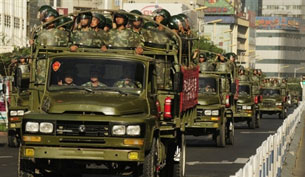2009-07-09
Chinese security forces crack down on cities with large Uyghur populations.

Chinese paramilitary police trucks drive through downtown Urumqi, July 9, 2009.
HONG KONG—Chinese security forces imposed an uneasy peace on several major cities in the restive Xinjiang Uyghur Autonomous Region (XUAR) Thursday, with residents reporting a heavy security presence in Kashgar and Ili prefectures.
Police and armored vehicles were patrolling the streets of Gulja (in Chinese, Yining), capital of the Ili Kazakh Prefecture, residents said.
“Now the situation in Gulja city is very tense,” one Uyghur man said.
“When I went out this morning to buy cooking oil, I saw the streets were filled with fully armed police wearing helmets.”
“I personally saw five armored vehicles driving along the street. There were so many police cars on all of the streets,” he said.
He said the gates of government buildings in the city were under heavy guard by armed police.
“Since I was not able to enter from the front gate to the Ili Normal Institute where I live, I came home going through a gate behind the school that was guarded by our school security personnel,” he added.
Protests spread
Demonstrations spread out to other Uyghur cities in the region following Sunday’s deadly riots in Urumqi in which at least 156 people died and 1,080 were injured.
One Uyghur man who called a listener hotline said more than 300 people gathered around Kashgar’s Id Kah Mosque, Guze district, and People’s Square to demonstrate, but were quickly dispersed by security forces.
He said police were currently conducting house-to-house searches in the city. Detentions have been reported by residents in Yili, Dawan, and Tianshan.
Official media reported that tourism had been hit by the recent unrest, saying some travel agencies had canceled trips to Ili and Kashgar.
Police in Gulja recently detained a number of Uyghur youths in an anti-separatism campaign ahead of the sensitive 60th anniversary of communist rule, sources in the region said.
Overseas rights groups say untold numbers of people were killed in anti-China protests in Gulja in February 1997, in a crackdown that went largely unnoticed by the outside world.
Meanwhile, in Urumqi, thousands of Chinese paramilitary police rumbled through Urumqi’s riot-battered streets Thursday, blaring propaganda urging ethnic unity.
Uyghur residents said however that armed majority Han Chinese were still visible on the streets of the city Wednesday.
“The Chinese are on the streets, holding batons and clubs. They are attacking some shops. But I have not personally seen anyone injured or killed,” one Uyghur man said.
“When the Chinese came out with batons and clubs, there is no one to stop them. They are pretending to stop them, but they are not really strict,” he said.
“If the Uyghurs had come out with batons and clubs, they would immediately be fired upon.”
Media blamed
The Uyghur man, a university student, said the relative media freedom around the Urumqi violence still appeared to be inciting further unrest.
“I think the government and the media are instigating the Chinese to seek revenge,” he said.
“The government is trying to portray the conflict between itself and the Uyghurs as a conflict among the people.”
A Uyghur women in Urumqi said some Uyghurs were afraid of further attacks, while others were outraged at a perceived difference in treatment of Uyghurs and Han protesters and rioters.
“If the government was as cruel towards them as they were towards the Uyghurs, they surely would be able to take care of the problem in a moment,” she said.
She said many in Urumqi expected worse to come. “It seems that there are going to be big problems. Everyone is talking about it.”
A second Uyghur student said police had held two groups of Uyghur and Han Chinese students at two universities apart.
“Today there was some friction between the Uyghur and Chinese students at the Xinjiang University of Medicine and Xinjiang University of Economics (XUE),” he said.
“Today, the students at XUE were about to go out and confront the Chinese rioters, but the police surrounded them, and did not allow them to go out.”
He said all able-bodied Uyghur young men had been removed from Uyghur neighborhoods in recent days.
“It is as if there are no men on our streets. I hope these people don’t come to where we live,” he added.
Warnings posted
Authorities posted notices urging rioters to turn themselves in or face stern punishment.
Urumqi Communist Party chief Li Zhi said he would seek the death penalty for rioters who resorted to “cruel means” and murdered people.
The notices, posted on walls in the Chinese and Uyghur languages, said those who hid or protected “criminals” would also be punished.
The Chinese government has accused exiled Uyghur leader Rebiya Kadeer of inciting the violence.
But exiled Uyghur groups say the Muslim, Turkic-speaking minority has long suffered ethnic discrimination, religious controls, and continued poverty despite China’s ambitious plans to develop the vast hinterland to the northwest.
Xinjiang is a strategically crucial vast desert territory that borders Russia, Mongolia, Kazakhstan, Kyrgyzstan, Tajikistan, Afghanistan, Pakistan, and India.
The region has abundant oil reserves and is China’s largest natural gas-producing region.
This week’s violence prompted President Hu Jintao to abandon a G8 summit in Italy, and he has returned home to monitor developments in Xinjiang where hundreds have been arrested in the ensuing crackdown.
Original reporting in Uyghur by Shohret Hoshur and Mehriban. Uyghur service director: Dolkun Kamberi. Written for the Web in English by Luisetta Mudie. Edited by Sarah Jackson-Han.
https://www.rfa.org/english/news/uyghur/clampdown-07092009101424.html


Leave a Reply